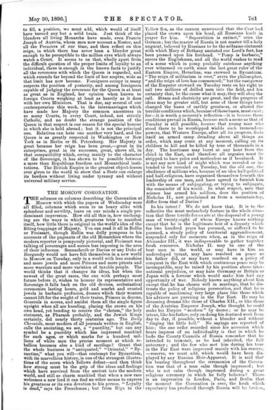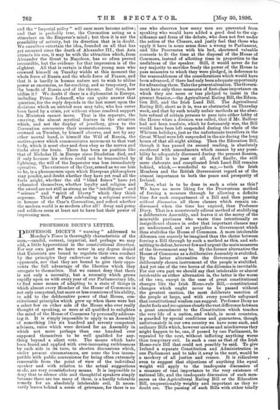THE MOSCOW CORONATION. T HE columns on columns describing the Coronation
at Moscow with which the papers of Wednesday were all filled, columns which seem to us heavy alike with splendour and servility, leave on our minds a single pre- dominant impression. How old all this is, how unchang- ing are the ways in which greatness tries to manifest itself, how little there is original in the world's idea of the fitting trappings of Majesty. You can read it all in Rollin or Froissart, though Rollin was dully pompous in his accounts of the pageants of the old Monarchies where the modern reporter is pompously pictorial, and Froissart was talking of personages and scenes less imposing in the area of their influence. Sennacherib or Darius or any Duke of Burgundy would not have felt themselves in a new world in Moscow on Tuesday, only in a world with less sunshine and more jewels and more Princes and more priests and more warriors and more varieties of taxable people. The world thinks that it changes its ideas, but when the newest of the great races, the one with perhaps most future before it, wishes to honour its representative and Sovereign it falls back on the old devices, ecclesiastical ceremonies lasting hours, gold and scarlet and crusted jewels in barbaric profusion, dresses which their wearers cannot lift for the weight of their trains, Princes in dozens, Generals in scores, and amidst them all the single figure upright when all are kneeling, placing the crown on his own head, yet bending to receive the "chrism," the holy ointment, as Pharaoh probably, and the Jewish Kings certainly, did nearly thirty centuries ago. The Daily Chronicle, most modern of all journals written in English, calls the anointing, we see, a "puerility," but can any symbol be a puerility which has impressed mankind for such ages, or which marks for a hundred mil- lions of white men the precise moment at which re- bellion becomes also a kind of sacrilege? Grant that the whole business is "antiquated," "Oriental," " By- zantine," what you will—that contempt for Byzantium, with its marvellous history, is one of the strangest illustra- tions of the scorn which follows defeat—and then think how strong must be the grip of the ideas and feelings which have survived from the ancient into the modern world, and still so charm mankind that when a new race welcomes a new lord it can find no other means to express his greatness or its own devotion to his person. "Loyalty is dead," says the Frenchman ; but from Riga, to the Ytllow Sae., as the cannon announced that the Czar had placed the crown upon his head, all Russians knelt in prayer for him. "Superstition is extinct," cries the German; but the master of Russia is not master till a holy unguent, believed by Russians to be the selfsame ointment with which Mary of Bethany anointed our Lord's feet, has been pressed upon his forehead. "Pomp is barbaric," sneers the Englishman, and all the world rushes to read of a scene which in pomp probably outshone anything ever witnessed on earth since the last great ruler of the Eastern Empire, Heraclius, was crowned in Byzantium. "The reign of militarism is over," avers the philosopher, "and the reign of love has commenced;" but the vast power of the Emperor crowned on Tuesday rests on his right to call two millions of drilled men into the field, and his certainty that, be the cause what it may, they will obey the call. Steam and electricity are great, and the progress of ideas may be greater still, but none of these things have changed the bases of earthly greatness, or altered the- terrible conditions which, because of those bases, must exist ; for—it is worth a moment's reflection—it is beca use these conditions prevail in Russia, because such a scene as that of Tuesday is still possible, because that young man who. stood there to be worshipped wields such tremendous powers, that Western Europe, after all its progress, finds. itself an armed camp dreading above all things an. order, which may come at any moment, calling on its children to kill and be killed by tens of thousands in a day. The hurricane may burst at any hour from the cloud in the East, and therefore all argosies must lie stripped to bare poles and motionless as if becalmed. It is not any new kind of might which was revealed or in- tended to be revealed on Tuesday, but the old one, the- obedience of millions who, because of an idea, half-political and half-religious, have organised themselves beneath the leadership of one man, and have agreed to furnish him with the means of subjugating, or trying to subjugate, the remainder of his world. In what respect, save that science has armed his soldiers, does the position of Nicholas II., now proclaimed as from a mountain-top, differ from that of Darius ?
In his intent ? We do not know that. It is to the reflective the most melancholy feature in the whole situa- tion that these terrific forces are at the disposal of a young man of twenty-eight of whom Europe knows nothing except that he is the legitimate heir of a dynasty which for two hundred years has pursued, or suffered to bo pursued, a, steady policy of territorial aggrandisement,. suspended only for moments when, as in the reign of Alexander III., it was indispensable to gather together fresh resources. Nicholas II. may be one of the best men in the world, or may have in him an undeveloped tyrant, may have resolved on peace as his father did, or may have resolved on a policy of conquest in the East with which continuous peace may be incompatible, may be raised by his position above inter- national prejudices, or may hate Germany or Britain or Japan with a fervour which would make him hail any opportunity of war. Nobody knows anything about him except that he has chosen well in marriage, that he dis- trusts the policy of religious persecution, and that be is capable of sanctioning very large plans like those which his advisers are pursuing in the Far East. Ho may be dreaming dreams like those of Charles XII., or like those of the Austrian Emperor Joseph, who thought he could make his Empire " modern " by decree ; or he may be intent, like his father, only on doing his destined work from day to day, if possible, without a blunder and without "ringing the little bell." No sayings are reported of him ; the one order recorded since his accession which bears impress of an individuality is that in which he bade the County Councils of Russia remember that be intended to transmit, as he had inherited, the full autocracy ; and the few who met him during his tour in the Far East were impressed mainly with his reserve, —reserve, we must add, which would have been dis- played by any Russian Heir-Apparent. It is said that his bearing throughout the ceremonies of the Corona. tion was that of a man calm though impressed ; but who is not calm though impressed during a greab religious ceremony in which he fully believes ? There is an impression in London, Paris, and Berlin that the moment the Coronation is over, the hush which expectancy has produced through Russia will be broken, and the "Imperial policy" will once more become active ; and that is probably true, the Coronation acting as a stimulant on the Emperor's mind ; but then it is not the possibility of activity, but its direction that is in doubt. We ourselves entertain the idea, founded on all that has yet occurred since the death of Alexander III., that Asia attracts his son, it may be with the attraction which, from Alexander the Great to Napoleon, has so often proved irresistible, but the evidence for that impression is of the slightest. All that is certain is that the young man who crowned himself on Tuesday wields at this moment the whole force of Russia and the whole force of France, and that it is hardly in human nature not to wish to utilise power so enormous, so far-reaching, and so temporary, for the benefit of Russia and of the throne. But then, how utilise it ? We doubt if there is a diplomatist in Europe, including Prince Lobanoff, who can quite answer that question, for the reply depends in the last resort upon the decisions which an untried man may take, who has never been faced by a crisis, yet without whose resolved support his Ministers cannot move. That is the separate, the amazing, the almost mystical feature in the situation which, and not the display of jewellery, gives to the Coronation ceremonies their momentousness. The man crowned on Tuesday, by himself observe, and not by any other mortal hand, is himself the Will of Russia, the motive-power which communicates movement to that vast body, which it must obey and does obey as the nerves and limbs obey the brain. There has been no position like that of Nicholas II. in Europe since Diocletian died, and if only because his orders could not be transmitted by lightning, the will of the Imperator was less immediately operative. The existence of the Czar, armed as we see him to be, is a phenomenon upon which European philosophers may ponder, and doubt whether they have yet read all the facts aright, whether the old "blind forces" have yet exhausted themselves, whether loyalty and religion and the sword are not still as strong as the " intelligence " and "science" and "spirit of liberty" which they think supreme. Think of Paris celebrating a religious service in honour of the Czar's Coronation, and reflect whether the modern world is so modern after all! Sway and pomp and soldiers seem at least not to have lost their power of impressing men.



































 Previous page
Previous page